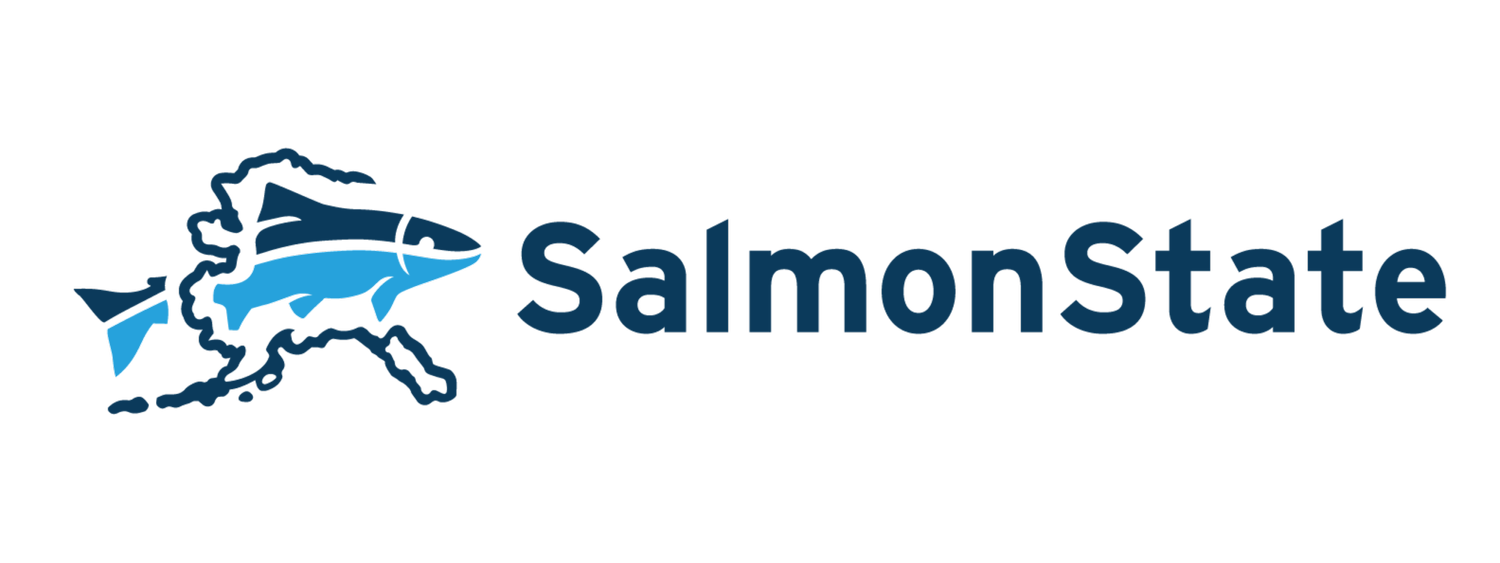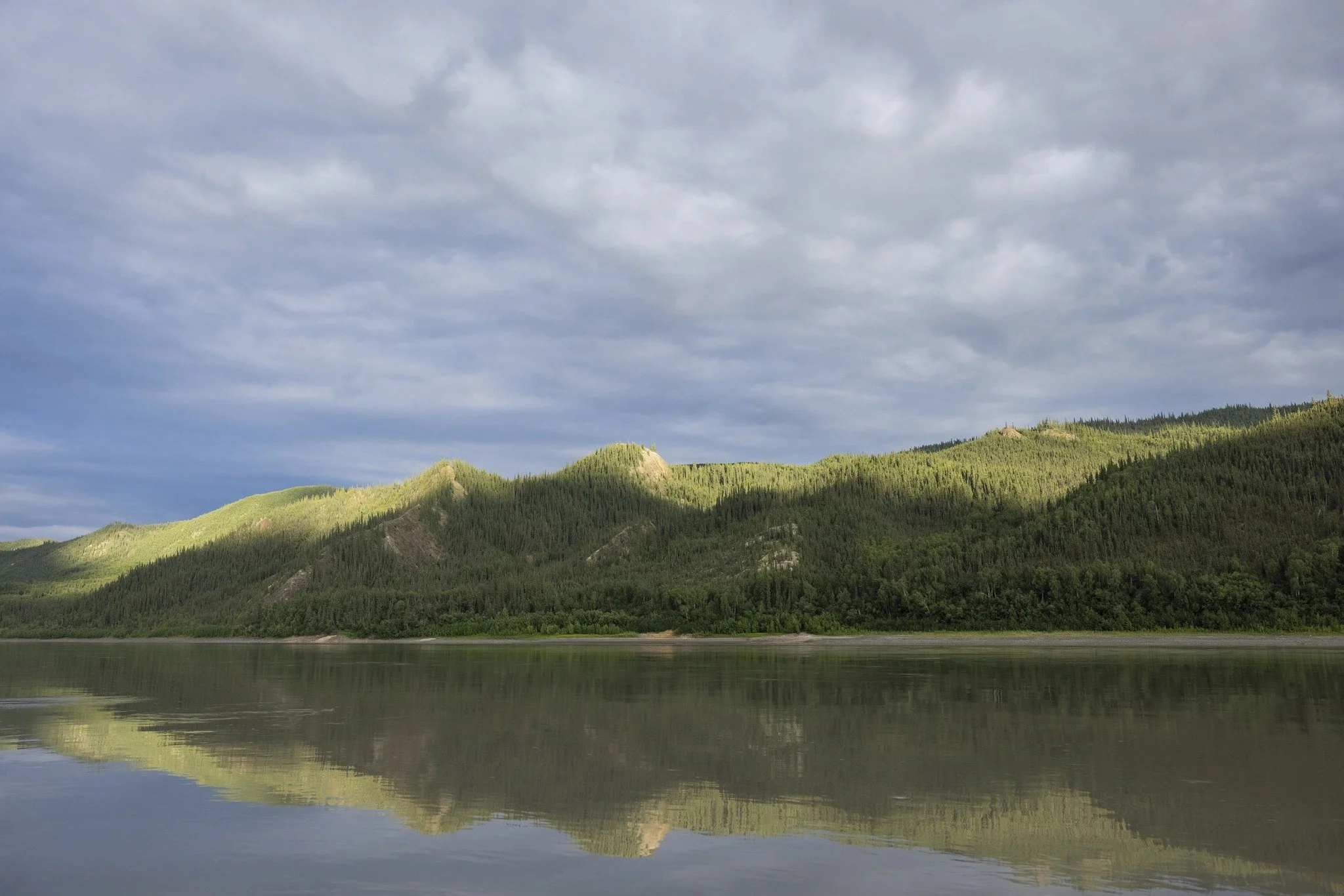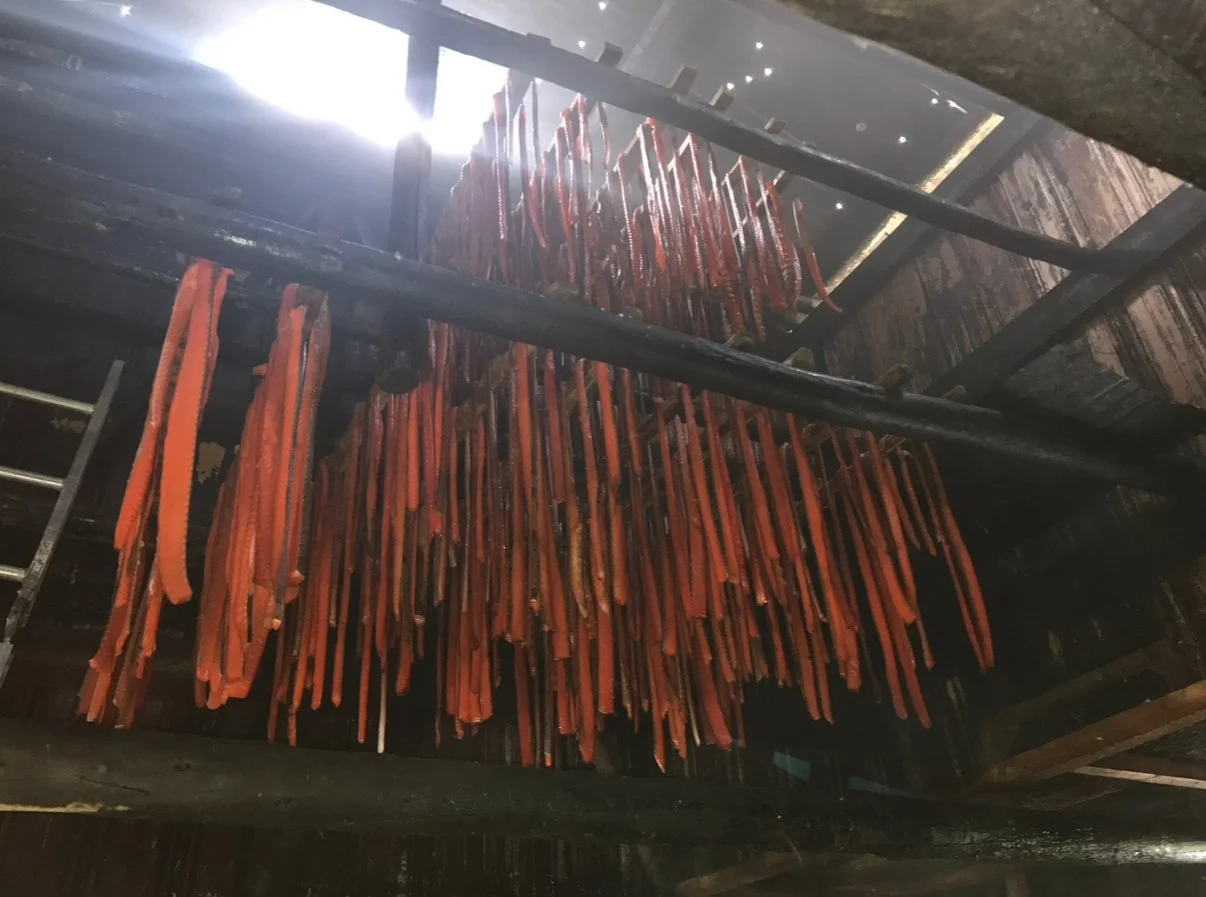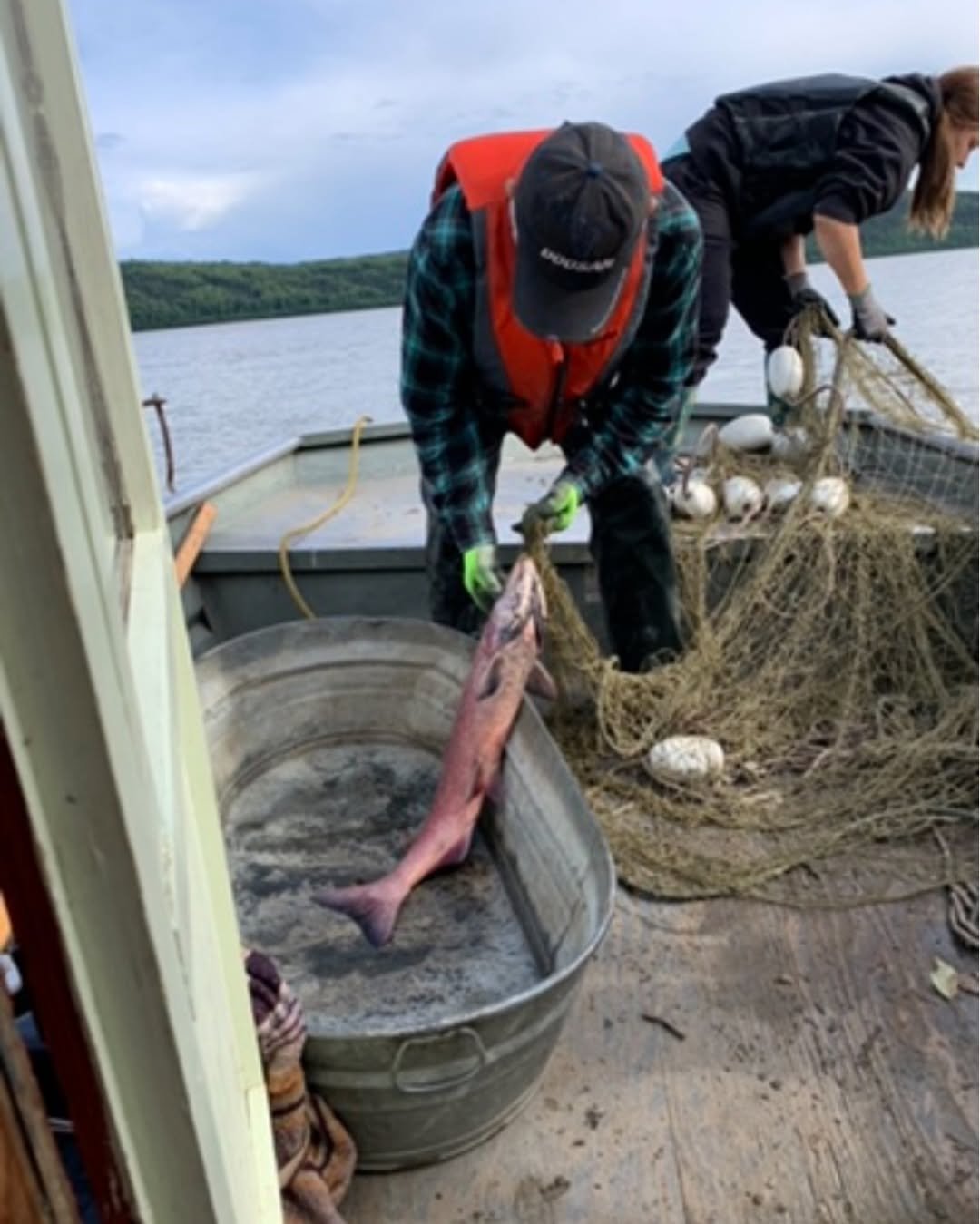Shaelene Nickoli
Bottom trawling destroys slow-growing ocean floor habitat and crushes bottom-dwelling species. “Midwater” trawlers drag the bottom in up to 100% of the area they trawl — and they’re allowed to trawl in protected areas closed to other fisheries for reasons of conservation.
Ban bottom trawling: salmonstate.org/bycatch
“My name is Shaelene Nickoli. I am from Ruby, Alaska. I'm married to my husband, Malcolm. We have 4 children, and we have lived in Ruby for 15 years.
I didn’t grow up fishing. My mom and my grandparents fished, but it wasn’t until a few years before it got shut down that I had learned how to cut fish. I was learning how to go set net, and check the net. I learned how to cut salmon. That’s when I really grew a deep connection, and I was like — what have I been missing out on all these years? I really grew to love the whole process of just working to catch your food.
I learned from a few different people. One of the elders here took the time to teach me. Then my whole family became a big part of the process of fishing, and cutting fish, and working in the smokehouse together.
And then It got shut down about seven years ago. And it was really disheartening to know that I only had a few years to be able to do that with my family. I could have had it all those years and I just didn't know what I was missing out on until it was gone.”
—Shaelene Nickoli of Ruby, Alaska
Photo 1: A trawler docked in Seattle, WA. Photo by Ryan Astalos. Photo 2: The Yukon River. Photo by Brooke Woods
“Our Elders are so full of wisdom. They're so knowledgeable. And I always heard the elders say ‘There's not going to be any fish one day. We're not going to be able to fish.’ I remember my mom saying that at the beach in Ruby, there used to be seagulls all over. There were so many people processing fish on the bank, and dog pots going with the scraps from the fish. You don't see that anymore.
And I often wondered how my grandma and our other Elders knew how there wasn't going to be any fish, until I started researching it. And then I realized the trawling came in the ‘70s and the ‘80s. That's when it became really big in Alaska. And our Elders seen the damages. They seen the beginning of the end of our kings. And they knew right at the beginning that it was going to have such a big effect on us.
You know, we have really strong beliefs and strong cultures and respect for our land and our animals. We don't take more than we need and we don't kill anything that we're not going to eat.
But that's exactly what these trawlers are doing with the bycatch. We've been shut down for fishing for seven years and we've been abiding by these rules. We’re like, ‘Okay, we'll listen. We won't fish. We'll see if it helps.’ And the numbers are still going down. The fish are running late. They're running later and later, and the numbers are still going down.
How is it that they're still going down and we've been shut down for 7 years? We're doing our part. I think it isn't too much to ask to start taking a different look at it. Try something else. Maybe just try to shut down the trawlers, or maybe monitor them more closely and make sure that they're abiding by all the rules and the guidelines, because we’ve been shut down for 7 years. This long, and the numbers are still going down. The late run for the fish — something else is going on. Something bigger. And no matter how loud we are, no matter how much we ask, nothing is being done about the trawling and the bycatch.”
—Shaelene Nickoli of Ruby, Alaska
Photo by Jacki Cleveland
“I work at a school, so it's only employment during the winter months. I was looking for employment in the summer months, and I came across a post on social media about doing outreach about trawl bycatch.
I love my community. I love working for my people. And I thought it was a really interesting position to be able to help and advocate for people, and to just be there to listen to them.
It's really moving to be able to be that listening ear for people. Especially Elders. Sometimes I'm on the phone with some elders for maybe up to 30 minutes, just listening to them while doing the surveys.
Because they just want to be heard. They're so full of wisdom. They're so full of knowledge. And they have a lot to say.
That's one of our traditional values, is to respect and listen to our Elders. And to just hear that pain in their voices when they're telling their stories, and the wisdom that they have to share, it’s very moving.
Someone told me the other day that people need to be heard. Everyone needs to be heard.
What's happening now isn't working. The numbers are still going down and the numbers are still low, so why not shut down one area each year?
How long is that bycatch in that net struggling for their life, struggling to get out to be free?
And then they're just let go with little to no life left. And those are the salmon that can make their way up the Yukon and to be able to spawn and to have more. And that's being taken away the second the trawlers put their net in the ocean.”
—Shaelene Nickoli of Ruby, Alaska
“We just had culture camp here in Ruby in July. It’s something that is put on annually by the tribe. The past couple of years, the tribe has been collaborating with YRDFA, the Yukon River Drainage Fisheries Association.
This year, we had the first ever permit to catch king salmon.
That was just amazing. It was such a treat. Like I said, it's been 7 years since we've been able to fish here on the Yukon River. And just to be able to see the children be a part of the whole process, from catching the salmon, to cutting it and cleaning it, working in the smokehouse, learning from the Elders, cooking it — and just looking around and watching all of the smiles, all of the happy faces when they seen that we were eating king salmon.
It was such a beautiful moment to be able to see all of the happy faces. Especially with the Elders. Some of them thought they weren't going to be able to eat king salmon again.
My son is 6 years old. It was his first time eating k’eyoge’. That's what we call half dry. He loved it. Oh my goodness, he wanted more. And as a parent, that was just such a beautiful feeling to be able to witness my children enjoying what we once enjoyed.”
—Shaelene Nickoli of Ruby
“We’re losing our elders here in Ruby. My grandma, she's the oldest. She was born in 1930. So she’s going to be 95 this year. She wasn't able to make it up to culture camp, but I put some fish aside for her and I sent it to her. And she said that she sat there when one of her grandchildren brought it to her, and she started crying.
They were like ‘Grandma, what's wrong. Are you OK?’ And she was just like, ‘I didn't think I would ever be able to eat this again.’
It's a bittersweet moment.
The trawlers, it's nothing to them. It's probably more of a hassle for them to have to deal with bycatch than anything. What's a hassle for them is a delicacy for us. It’s sad.”
—Shaelene Nickoli of Ruby, Alaska
“There's quite a few favorite memories I have of fishing. My aunt and uncle, they brought us up to fish camp a couple summers in a row. We would set net right out in front of camp. The fish camp is called Big Eddy, and there's literally a big eddy right in front of camp. We would set net there.
It’s such a beautiful camp. There's a big fish cutting area and there's a big smokehouse, and there's a creek that runs right alongside there, so there's a hose that we have hooked up to help clean the fish.
Fourth of July is a big deal here in Ruby. They have a lot of races, and games for the youth and for everybody to participate. But one year we weren't in Ruby for the Fourth of July. We were up at fish camp. And that was probably the best Fourth of July that I've ever had, just being up at fish camp working on fish.
We went over to an island. I think it's about 25 miles upriver. There was myself, my aunt, uncle, husband, and our, at that time, three kids. We went over to the island and we swam, and we made a little campfire, and we brought some fish. We got some half dry, and we put it on a stick, and we roasted it over the campfire. And it was just so delicious. It was such a fun and happy memory.”
—Shaelene Nickoli of Ruby, Alaska
“Another favorite fishing memory is, my husband and I, we got married on July 14th, 2012. So for our anniversary my late uncle, who was the traditional chief of Ruby, and my auntie, they brought us out for our anniversary. And that was the best anniversary we've ever had. It was just so beautiful. And to be able to learn from our respected Elders — I remember we got caught up on a log underwater. And I was starting to worry. I was just like, ‘Oh my gosh, what are we going to do?’
Because you hear stories about how you're going to have to probably cut the net cause if the log is too big, it can take the boat. I remember I was starting to worry and my auntie was like, ‘Dad, we got caught. There's a log.’ And he was like, ‘Oh no. OK. Hold on.’ And he was just so calm. It really reassured me. And he just backed up a little bit, and moved the boat a little bit, and then moved forward and just like that we were out. And I was like, ‘He made that so easy.’
Our Elders are just so smart, and we have so much to learn from them. That was just a beautiful memory that I have of my late uncle and my auntie, and really appreciate that they took the time to bring us out to subsist for king salmon on our anniversary.”
—Shaelene Nickoli of Ruby, Alaska
“The future for salmon is scary, and it's heartbreaking. But the future that I hope for my children and my grandchildren is to ban bottom trawling. The effects that bottom trawling has on our king salmon and other species are so harmful.
There's so many people speaking about it, and there's so much proof to show how detrimental the effects are for our king salmon. And we're being ignored.
It’s really sad how powerful money is. Because really, that's what it is. It's just greed, and it's money. And that’s against our cultural values. Our traditional ways of life. Even in the Bible, it says that. God put people in charge of our animals and our land. Our cultural values preserve our animals and our land. But the way things are going with other people in charge of our fish and our land, it's not being preserved. It's being taken away. We're just watching it deplete. Every day. Every year. And all that we're asking is to ban bottom trawling. Even just enough to see if it makes a difference. I guarantee you it will.”
—Shaelene Nickoli of Ruby, Alaska
“As much as we are telling our stories, sharing our concerns — we can scream until we get blue in the face and pass out, and nothing is being done. I just want to ban bottom trawling and just see if it makes a difference. For a few years.
Just monitor. Do your counts. And then ban it for a few years. And I guarantee you there will be a tremendous difference. The counts will start going back up. Fish will start running and hitting when they usually do. And then gradually start opening up to the places that have been closed.
It's our turn to be able to enjoy what we grew up doing. It would be really nice for our Elders to be able to have their king salmon again.”
—Shaelene Nickoli of Ruby, Alaska










